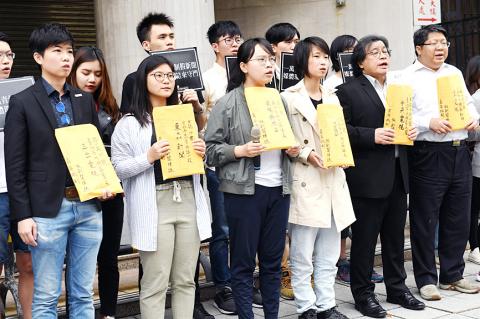A coalition of student groups yesterday announced the establishment of the Youth Front for Boycotting Fake News, with experts highlighting Beijing’s increased interference in Taiwan’s public communication channels.
More than 100 university and high-school student groups, along with more than 50 experts, have pledged to support the front, which was established last week.
The front’s creation followed student-led campaigns last month on National Taiwan University’s (NTU) and National Chengchi University’s campuses to boycott TV stations allegedly broadcasting false or biased news reports in favor of certain politicians, NTU Student Association president Michelle Wu (吳奕柔) told a news conference in front of the Legislative Yuan in Taipei.

Photo: CNA
Front members said they would mail a pledge to produce verified and objective reports, as well as the Chinese-language book Critical Media Literacy (批判的媒體識讀), which is used as teaching material at Shih Hsin University, to six TV news stations to remind them of basic journalistic ethics.
The front is targeting TV stations because they are the main source of information for older people, said front spokesman Chen Ku-hsiung (陳估熊), who is also the president of the National Cheng Kung University Student Association.
Taiwan Citizen Front founder and lawyer Lai Chung-chiang (賴中強) said that China has been expanding its influence over Taiwanese media, despite opponents of media monopolization in 2012 blocking Want Want China Times Media Group (旺旺中時媒體) from buying cable service operator China Network Systems Co (中嘉網路).
Chinese-backed media monopolization efforts no longer target a single media outlet, but have become a universal phenomenon in Taiwanese media, Lai said.
The campaign against false news reports is a new student movement following the 2014 Sunflower movement, and it has rallied groups promoting transitional justice, students’ rights and high-school curricular reform, Academia Sinica Institute of Taiwan History associate research fellow Wu Rwei-ren (吳叡人) said.
Chinese authorities and their proxies in Taiwan must not underestimate the civic power of Taiwanese society, he said.
Asked to comment on the Democratic Progressive Party’s performance, he said that as the party remains the most important party in Taiwan, it is crucial that it does not fall apart after its presidential primary.
When national security is threatened, President Tsai Ing-wen (蔡英文) and former premier William Lai (賴清德) — who are vying to become the party’s presidential nominee — should put aside their egos and rethink what they should do to protect the nation, he added.

MAKING WAVES: China’s maritime militia could become a nontraditional threat in war, clogging up shipping lanes to prevent US or Japanese intervention, a report said About 1,900 Chinese ships flying flags of convenience and fishing vessels that participated in China’s military exercises around Taiwan last month and in January have been listed for monitoring, Coast Guard Administration (CGA) Deputy Director-General Hsieh Ching-chin (謝慶欽) said yesterday. Following amendments to the Commercial Port Act (商港法) and the Law of Ships (船舶法) last month, the CGA can designate possible berthing areas or deny ports of call for vessels suspected of loitering around areas where undersea cables can be accessed, Oceans Affairs Council Minister Kuan Bi-ling (管碧玲) said. The list of suspected ships, originally 300, had risen to about 1,900 as

Japan’s strategic alliance with the US would collapse if Tokyo were to turn away from a conflict in Taiwan, Japanese Prime Minister Sanae Takaichi said yesterday, but distanced herself from previous comments that suggested a possible military response in such an event. Takaichi expressed her latest views on a nationally broadcast TV program late on Monday, where an opposition party leader criticized her for igniting tensions with China with the earlier remarks. Ties between Japan and China have sunk to the worst level in years after Takaichi said in November that a hypothetical Chinese attack on Taiwan could bring about a Japanese

Right-wing political scientist Laura Fernandez on Sunday won Costa Rica’s presidential election by a landslide, after promising to crack down on rising violence linked to the cocaine trade. Fernandez’s nearest rival, economist Alvaro Ramos, conceded defeat as results showed the ruling party far exceeding the threshold of 40 percent needed to avoid a runoff. With 94 percent of polling stations counted, the political heir of outgoing Costa Rican President Rodrigo Chaves had captured 48.3 percent of the vote compared with Ramos’ 33.4 percent, the Supreme Electoral Tribunal said. As soon as the first results were announced, members of Fernandez’s Sovereign People’s Party

MORE RESPONSIBILITY: Draftees would be expected to fight alongside professional soldiers, likely requiring the transformation of some training brigades into combat units The armed forces are to start incorporating new conscripts into combined arms brigades this year to enhance combat readiness, the Executive Yuan’s latest policy report said. The new policy would affect Taiwanese men entering the military for their compulsory service, which was extended to one year under reforms by then-president Tsai Ing-wen (蔡英文) in 2022. The conscripts would be trained to operate machine guns, uncrewed aerial vehicles, anti-tank guided missile launchers and Stinger air defense systems, the report said, adding that the basic training would be lengthened to eight weeks. After basic training, conscripts would be sorted into infantry battalions that would take